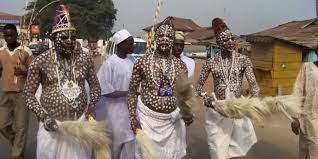”Where the Oro drum beats, the community’s order is upheld.”
This adage shows the vital role that Oro worshippers play in maintaining social harmony and discipline within their communities.

Oro worshippers are adherents of the Oro deity, which is a significant figure in the Yoruba religion and culture.
Communal Cleansing
The Oro deity is considered a powerful spirit associated with justice, discipline, and communal protection.
The rituals conducted during the Oro Festival is believed to cleanse the community, ward off evil spirits, and ensure social harmony.
Gender-Specific Participation
Oro festivities and rituals have historically been ruled by men.
Also, It is typically forbidden for women and non-initiated people to participate in or even observe some aspects of the rites.
Women and children are frequently asked to remain indoors during certain Oro Festival periods.
This is to prevent them from coming into contact with the ceremonial processions.
Oro ceremonies and rituals are timed with great secrecy.
Announcements
Also, the community is informed by specific signals like drumming or declarations in public.
In modern times, announcements about the festival may also be circulated via social media or public notices to inform residents about the restrictions and expected activities.
Controversy
The Oro practice has sometimes been a source of conflict
This is seen when it intersects with modern civic activities or political events.
Civic activities or Political events such as protests and elections.
Oro worship has evolved with modern technology.
People Also Read: Reasons #EndBadGovernanceInNigeria Protest Will Likely Hold
Legal and social issues persist, particularly in regions with restrictions on women and non-participants.

